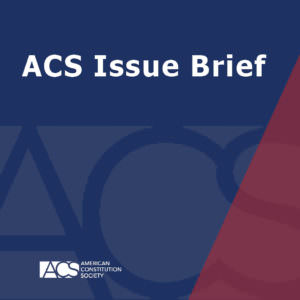Judicial Hostility to Litigation and How It Impairs Legal Accountability for Corporations and Other Defendants
Schaden Chair in Experiential Learning, Professor of Law, University of Colorado Boulder Law School

ACS is pleased to distribute "Judicial Hostility to Litigation and How It Impairs Legal Accountability for Corporations and Other Defendants," an Issue Brief by Scott A. Moss, Associate Professor of Law at the University of Colorado Law School. In this Issue Brief, Professor Moss explains how the Supreme Court’s jurisprudence since the 1990s has moved away from treating litigation “as an important tool for redressing grievances, deterring wrongdoing, and spurring social reform” toward a negative view of litigation, a view that emphasizes litigation’s burdens on defendants. The author carefully describes what, in his view, is this new and troubling jurisprudence—changing longstanding dismissal standards, raising burdens of proof and creating inconsistent standards for discrimination claims, creating a broad role for federal courts to reverse state court damages awards and limit punitive damages, and allowing corporations and employers to force consumers and employers to waive their rights to their day in court—and asserts that this shift comes at a real price “for workers, consumers, and other individuals trying to use litigation to protect their rights....” Professor Moss considers the possibility that this anti-litigation stance may be explained, at least in part, by the homogeneity of background of the current Supreme Court Justices:
"[T]he modern Court that regularly expresses hostility to litigation as a tool of dispute resolution and social reform consists of Justices largely homogeneous in their professional background of civil litigation defense, of policy work rather than litigation, of serving institutional rather than individual clients, and of not working on affirmative public interest civil litigation. The current Justices’ backgrounds, while impressive in many ways, are also surprisingly similar."
In the past, the Supreme Court has contained a lifelong practitioner (Justice Powell), a union-side labor lawyer (Justice Goldberg), a civil rights lawyer (Justice Marshall), and a medical nonprofit lawyer (Justice Blackmun). As the nation considers the vacancy that will result from the announced retirement of Justice Stevens, this Issue Brief could serve to remind policymakers of the value of considering diversity of background in the judiciary, particularly the Supreme Court. Professor Moss opines:
"[T]here is troubling uniformity of perspective on the Court when Justices all arrive from the federal appellate bench and, before the bench, mainly represented corporations or served in policymaking, rather than litigation, posts. That uniformity of perspective risks privileging the portion of the legal profession from which the Justices came (i.e., lawyers for corporate clients and for the government), to the disadvantage of those who use the law to serve different interests—such as lawyers challenging malfeasance by the sort of corporations and governmental entities almost all of the current Justices represented as lawyers."
Read the full Issue Brief here: Judicial Hostility to Litigation and How It Impairs Legal Accountability for Corporations and Other Defendants
